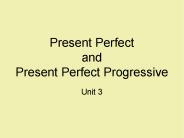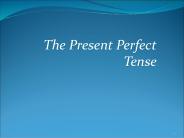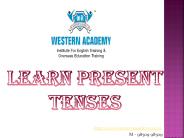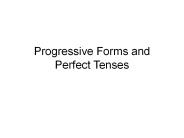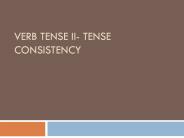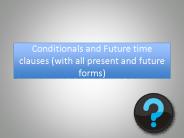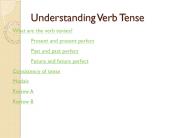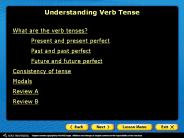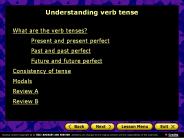Present Perfect Continuous Tense PowerPoint PPT Presentations
All Time
Recommended
PRESENT TENSES PRESENT SIMPLE PRESENT CONTINUOUS PRESENT PERFECT AIM: TO REVISE PRESENT TENSES 1. I m learning Chinese. 2. You ve walked across the Amazon jungle.
| PowerPoint PPT presentation | free to download
The present perfect tense The present perfect continuous tense Present perfect simple vs. Present perfect continuous tense Practice exercises. Present perfect tense ...
| PowerPoint PPT presentation | free to view
Upgrade 2 - Unit 4 Grammar Reference Simple Past vs. Present Perfect and Present Perfect Continuous Yes, I have. Twice! Have you ever been to Florian polis?
| PowerPoint PPT presentation | free to download
Unit 3 Present Perfect, Present Perfect Progressive, and Simple Past Tense
| PowerPoint PPT presentation | free to view
Unit 3 Present Perfect, Present Perfect Progressive, and Simple Past Tense
| PowerPoint PPT presentation | free to view
Unit 3 Present Perfect, Present Perfect Progressive, and Simple Past Tense Notice the contrast in the tenses Present perfect & present perfect progressive Things ...
| PowerPoint PPT presentation | free to view
Present Perfect A+ Let s look at the ... escribir escrito ver visto morir muerto decir dicho hacer hecho romper roto Los irregulares en el Participio Pasado Verbo ...
| PowerPoint PPT presentation | free to view
Present Perfect and Present Perfect Progressive Unit 3
| PowerPoint PPT presentation | free to download
Gain a complete knowledge and information about Present Perfect Continuous Tense at Grammarcollege.com. It is the online study portal which designed for basic learners with great content.
| PowerPoint PPT presentation | free to download
the Present Perfect Continuous Tense also called: the Present Perfect Progressive Meaning: The present perfect continuous is very similar in meaning to the present ...
| PowerPoint PPT presentation | free to view
- Future continuous, going to, Present continuous - Future perfect, will Future continuous (will/won t+be+-ing) The future continuous tense expresses action at a ...
| PowerPoint PPT presentation | free to view
Title: Unit 2 Let s watch a movie Author: user Last modified by: katluikam Created Date: 9/26/2004 12:13:14 PM Document presentation format:
| PowerPoint PPT presentation | free to view
present perfect tenses
| PowerPoint PPT presentation | free to download
Title: Primary Six English Grammar Author: Lau's Family Last modified by: dns Created Date: 7/13/1999 1:33:00 PM Document presentation format: (4:3)
| PowerPoint PPT presentation | free to download
In this show, you will see subsequent steps in teaching present perfect tense to intermediate students.
| PowerPoint PPT presentation | free to download
You have been waiting here for two hours. Have you been ... Sam has been having his car for two years. Not Correct. Sam has had his car for two years. Correct ...
| PowerPoint PPT presentation | free to view
THE PAST PERFECT CONTINUOUS TENSE Form This tense is formed with had been + the present participle. It is the same for all persons: I had / I'd been working We ...
| PowerPoint PPT presentation | free to view
Mgr. Ema Jaro ov We use Present perfect simple Present perfect continuous To describe an activity that is complete I ve read several books about windsurfing.
| PowerPoint PPT presentation | free to view
EX: I have read the instructions but I don't understand them. ... S is superlative/ordinal number/only Noun (that) Present Perfect ...
| PowerPoint PPT presentation | free to view
Subject. have/has. verb. I have washed my shirt. Past Present ... such as subject-verb agreement, pronoun-antecedent agreement, verb forms, and parallelism; ...
| PowerPoint PPT presentation | free to view
Strengthen your knowledge and improve your skills in the English language.
| PowerPoint PPT presentation | free to download
Rules Used in Present Tenses
| PowerPoint PPT presentation | free to download
Continuous Tenses present by No. 10 , 18 , 20 , 22 , 23 ,24 Class 5/1 Simple Continuous Tense Subject + v. to be + v. ing + object ...
| PowerPoint PPT presentation | free to view
So let s talk about the FORM of the PRESENT PERFECT TENSE first OK? The Present Perfect Tense is formed by 2 things: the auxiliary verb HAVE and HAS (in all ...
| PowerPoint PPT presentation | free to download
PRESENT TENSES. Present tenses. There are four present tenses in English: ... With stative verbs: be, have, understand, love, see... I've had my car for years. ...
| PowerPoint PPT presentation | free to download
PRESENT PERFECT SIMPLE & CONTINUOUS What's the difference? PRESENT PERFECT SIMPLE FORM: have / has + past participle USES: 1. LIFE EXPERIENCES I ve been to China ...
| PowerPoint PPT presentation | free to download
Correct You had previously studied English before you ... Reference http://www.englishpage.com/verbpage/presentperfect.html English Grammar by Betty Schrampfer Azar ...
| PowerPoint PPT presentation | free to download
Easy way to learn English
| PowerPoint PPT presentation | free to download
Tips on Present Tense [ https://learningpundits.com/module-view/10-present-tense/1-tips-on-present-tense/ ]. LearningPundits helps Job Seekers make great CVs [ https://learningpundits.com/module-view/1-cv-preparation-for-freshers/1-cv-writing-tips-for-freshers/ ] , master English Grammar and Vocabulary [ https://learningpundits.com/course/4-english-grammar/ ] , ace Aptitude Tests [ https://learningpundits.com/course/11-mathematical-aptitude/ ], speak fluently in a Group Discussion [ https://learningpundits.com/module-view/6-group-discussion-questions/1-tips-for-speaking-in-a-group-discussion/ ] and perform well in Interviews [ https://learningpundits.com/course/2-personal-interview/ ] We also conduct weekly online contests on Aptitude and English [ https://learningpundits.com/contest ]. We also allow Job Seekers to apply for Jobs [ https://learningpundits.com/applyForJobs ]
| PowerPoint PPT presentation | free to download
Introduction to Present Perfect How long have you lived in the United States? How long have you been here? All sentences have verbs. Minimum--one verb in every ...
| PowerPoint PPT presentation | free to download
Perfect Tenses in English Simple Past Acci n que empez y acab en el pasado. I studied English last Saturday/ 2 hours ago. Estudi ingl s el s bado pasado ...
| PowerPoint PPT presentation | free to download
Have you met Ray? Yes, I met him when we were students. My parents have been ... I didn't see Rachel this morning. Did you? No, she didn't come in at all. ...
| PowerPoint PPT presentation | free to view
Present Perfect Continuous have / has + been + present participle I have been working all the time . ... The tense used can depend on the time expression.
| PowerPoint PPT presentation | free to view
Have you ever lived abroad? ... Do you like travelling? Are you planning a trip anywhere at the moment? ... Last modified by: Korisnik
| PowerPoint PPT presentation | free to download
Perfect Tenses in English Simple Past Acci n que empez y acab en el pasado. I studied English last Saturday/ 2 hours ago. Estudi ingl s el s bado pasado ...
| PowerPoint PPT presentation | free to download
Progressive Forms and Perfect Tenses Progressive Forms The present progressive form of a verb expresses action or a condition that is continuing in the present.
| PowerPoint PPT presentation | free to download
VERB TENSE II- TENSE CONSISTENCY Simple present: She talks Present perfect: She has talked Simple past: She talked Past perfect: She had talked Future: She will talk ...
| PowerPoint PPT presentation | free to download
I read that book' means that it's over and done with. ... the present perfect means that the action is complete but still going on in ...
| PowerPoint PPT presentation | free to view
Present perfect and past simple (I have done and I did) The present perfect is a present tense. It always tells us something about now. The past simple tells us only ...
| PowerPoint PPT presentation | free to download
Teacher: Mrs. Francesca Garito. a.s. 2002/2003. When to use the simple past ... Or when the time is asked about. When the action clearly took place at a ...
| PowerPoint PPT presentation | free to view
English Grammar Tenses-Continuous-Continuous Present continuous Past continuous Future continuous Present perfect continuous Past perfect continuous Future ...
| PowerPoint PPT presentation | free to view
Ariane Natalie Ren e Past + present tenses Forms Rules exercices Forms Present simple Present continuous Past simple Past continuous Present perfect simple ...
| PowerPoint PPT presentation | free to download
First conditional You can use any present tense in the if clause (present simple, continuous or perfect) and any future form (will, going to, future perfect, ...
| PowerPoint PPT presentation | free to download
THE PAST PERFECT TENSE. Form: Past tense of TO HAVE (had) past participle. Had they worked? ... had been present participle. Had they been working? they ...
| PowerPoint PPT presentation | free to view
Understanding Verb Tense What are the verb tenses? Present and present perfect Past and past perfect Future and future perfect Consistency of tense
| PowerPoint PPT presentation | free to view
Understanding Verb Tense What are the verb tenses? Present and present perfect Past and past perfect Future and future perfect Consistency of tense
| PowerPoint PPT presentation | free to download
Understanding verb tense What are the verb tenses? Present and present perfect Past and past perfect Future and future perfect Consistency of tense
| PowerPoint PPT presentation | free to download
(present continous) ... Present tense with have Using the past simple Using the past continuous Using the Present perfect Using the Past perfect For future ...
| PowerPoint PPT presentation | free to download
VERB TENSES Verbs can change ... THE CONTINUOUS/PROGRESSIVE TENSES TENSE EXAMPLES USES Present continuous They are watching television. To show an action that begins, ...
| PowerPoint PPT presentation | free to view
Understanding Verb Tense What are verb tenses? Present and present perfect Past and past perfect Future and future perfect Consistency of tense Review A
| PowerPoint PPT presentation | free to view
NARRATIVE TENSES How do they work? English Department III Unit Level10th C. Roessler Narrative Tenses Present Perfect We use the Present Perfect to say that ...
| PowerPoint PPT presentation | free to download
tense contrasts past simple: decided past continuous: was looking past perfect simple: had happened past perfect continuous: had been working Use past simple, past ...
| PowerPoint PPT presentation | free to download
tense contrasts past simple: decided past continuous: was looking past perfect simple: had happened past perfect continuous: had been working Use past simple, past ...
| PowerPoint PPT presentation | free to download
narrative tenses past simple. past continuous. past perfect. past perfect continuous. past simple past simple verbs can be: regular v+-ed irregular 2nd column.
| PowerPoint PPT presentation | free to download
Tenses Overview Each of the three tenses has four forms or sub-divisions to show continuity or completeness of the action and time. These are : Indefinite Continuous or Imperfect Perfect Perfect Continuous
| PowerPoint PPT presentation | free to download
Understanding verb tense What are the verb tenses? Present and present perfect Past and past perfect Future and future perfect Consistency of tense
| PowerPoint PPT presentation | free to download








